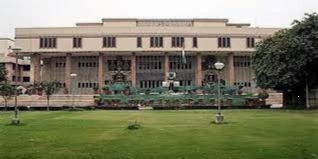Criminalization of marital rape: An Overview
Why in news
There is a series of Public Interest Litigations (PILs) challenging the “marital rape exception” clause in Section 375 of the Indian Penal Code (IPC) that is being heard by the Delhi High Court. Petitioners prayed for nullification of exception of section 375 of the Indian Penal Code and to the criminalization of marital rape in India. In January 2022 the Delhi High Court started hearing these petitions together. The bench of Justice Rajiv Shakdher and Justice C. Hari Shankar is hearing these petitions.
Key contentions on behalf of both parties on marital rape
The Petitioners
section 375 provides the exception of rape as “Sexual intercourse by a man with his wife who is above the age of 15, is not sexual assault.” According to the petitioners, this exception violates a woman’s right to dignity, personal and sexual autonomy and her right to self-expression enshrined under the Constitution of India. The Petitioners taking support from Justice J.S. Verma committee report, 2013 and 2017 Supreme Court judgment

The state and Central Governments
The Delhi Government (advocate Nandita Rao) replied “the exception to section 375 does not violate the right of privacy and the dignity of married women. This exception does not leave a married woman remediless pursuant of forced sexual intercourse by her husband. And also that the exception does not compel a wife to have sexual intercourse with the husband. The woman subjected to sexual violence by her husband has several other criminal avenues available to her and therefore changing the IPC section is not necessary.
An affidavit filed by the Central Government stated that criminalising “marital rape” would “destabilise the institution of marriage and become a tool to harassment of husbands.” In a new affidavit filed on January 2022, the Government has taken the stance that consultation on this “contentious issue.”
An NGO “Men’s Welfare Trust” and “Men’s Rights” are also opposing the petitions.
Amicus Curiae (senior advocate Rebecca John and Rajshekhar Rao): nullification of exception (2) in not amount to creating a new offence and the court has to power to do so.
What is marital rape?
Though the law does not define this term. But in a general sense, this term is used to describe a sexual act committed by a spouse without another spouse’s consent. According to IPC, only a man can be accused of rape. Therefore “a sexual act committed by the husband without wife’s consent” is marital rape.

The present law on marital rape?
Section 375 exception defines a crime of “rape”. This section itself provides an exception as “Sexual intercourse by a man with his own wife who is above the age of 18, is not sexual assault.”
Section 198 (6) in the Code of Criminal Procedure, 1973 “No Court shall take cognizance of an offence under section 376 of the Indian Penal Code, where such offence consists of sexual intercourse a man with his own wife, the wife being under fifteen years of age if more than one year has elapsed from the date of the commission of the offence.”
It means the husband can be guilty of raping his wife only in two conditions:
1. If the wife is below 15 years, and
2. If wife living in judicial separation.
In other situations, a husband does not have any legal obligation to take the consent of his wife. In another word, if a man has intercourse with a woman above the age of 15 years, he can be punished, but the same man does the same act with the same woman after performing a marriage ceremony, then he cannot be punished and wife is remediless. It means marriage ceremony legalized an offence of rape. This is the basic argument forwarded for the criminalization of marital rape.

Some other relevant legal provisions
Section 9 of Hindu Marriage Act- though this section is not directly related to marital rape. But the contention for challenging the legal validity of this section is similar. This section provides provisions for “restitution of conjugal rights”. The principle behind this matrimonial remedy is that matrimonial bond is associated with many legal and social obligations, therefore no spouse can withdraw from his/her matrimonial house or relationship unilaterally without any reasonable ground. This matrimonial relief originated from the old Roman law where the wife was considered as “husband’s property” and the state had obligation to deport her to her husband if she ran away from their matrimonial house.
The validity of this section was challenged before the Supreme Court on the ground the similar ground as marital rape. Petitioner prefered contention that “to force a married woman to intercourse with her husband against her will is an amount to the derogation of her dignity and cruelty against her.” Though the court upheld the validity of this section and this relief is available for husband and wife equally.
Sections 498A and 304B Indian Penal Code (IPC) – provides for cruelty by husband (or his relative). But this cruelty must be related to dowry demand.
The Protection of women against domestic violence Act, 2005 (in short Domestic Violence Act, 2005) – is a comprehensive Act to protect women from four types of cruelties- physical, sexual, financial and mental cruelty. A wife can seek legal help in case of even sexual cruelty by husband. Unnatural sexual acts, to force wife to intercourse during her illness or other act which can be physically painful or emotionally humiliating for wife are some instances of sexual cruelty by husband committed on his wife.
Section 319-338 of IPC provides penal provisions for the offence of hurt. These are general provisions and applicable to all. If the husband hurt his wife he can be punished under relevant general provisions. This remedy is available for the husband also. As said earlier only a man can be punished for the offence of rape. If such a crime is committed upon a man by a woman, then a woman can charge for the offence of hurt (and not for rape).
Why marital rape should be declared a punishable crime?
If the husband sexually exploits his wife to prove his dominance and strength, this can be a form of violation of the basic fundamental rights of life with dignity and privacy of a married woman. The fundamental “right of equality” is also violated when a married woman cannot get a remedy against her husband only because he married her. Marriage cannot grant a licence a husband to do whatever he wants to do with his wife.
A woman should always feel safe within the four walls of marriage. The emotional consequences of continued mental and physical torture by the husband is permanent and grave for a wife.
The arguments have also raised the issue of a woman’s autonomy and whether modern democracy can continue to rely on 17th-century legal principles that regarded women as “property of the husband,” with no decision-making power or autonomy.
According to the statistics, 52 countries, including our neighbour Nepal, in the world have criminalized marital rape and have considered it as a criminal offence. The first country to criminalise marital rape was the Soviet Union in 1922.
The J.S. Verma Committee, set up after the December 2012 Nirbhya case had recommended removing the marital rape exception (report submitted in 2013).
Gujarat High Court’s decision in Nimeshbhai Bharatbhai Desai vs. State of Gujarat (2018), (Justice J. B. Pardiwala) had said that the law must uphold the bodily autonomy of all women, irrespective of their marital status.
The essence of an offence under the Domestic Violence Act or section 319-338 of IPC is cruelty and hurt. But the essence of an offence under section 376 is “consent”. Supporter of criminalization of marital rape, therefore, demanding nullification of above-mentioned exception of section 376 and not considering present law sufficient.
Why marital rape should not be declared a punishable crime?
Practically it is very hard to prove the “consent” or “not consent” under a conjugal relationship.
The criminalization of marital rape can open a Pandora of litigation, but the court will have no strict criteria/measures to convict or acquit the accused husband. This may lead to further overburden on the judiciary system but none will get benefitted practically.
Since the presence of “non-consent” in such a very private affair within the four walls is hard to prove. Therefore, ultimately the court will have to rely on some external or bodily injury or circumstantial evidence. On these grounds, even at present, the wife can seek legal remedy under the Domestic Violence Act or relevant provisions of the Indian Penal Code or Matrimonial laws. Hence, present legal provisions are sufficient to protect the wife from any wrongful act of the husband. So, there is no use of a new law offence.
Criminalization of such nature of private act may lead to increase false cases against the husband. Experience shows, in so many cases matrimonial disputes arise due to normal tear and wear of marital life, but the wife misuse anti-dowry law to achieve her goal.
Family is the basis of a civilized society. This type of law may shake the very root of the family bond.
Delhi Government has raised the issue of “social disharmony” and “damage to marriage and family systems” in its 2016 affidavit.
Since rape is a serious offence, carrying long jail terms, it would have a very negative effect if the allegation were raised during a matrimonial dispute. To bring the heinous word “rape” in a marital relationship has the potential for serious misuse and harm to the reputation of the husband.
It will not good for children born out from a relationship where their father was punished for such a heinous crime upon their mother.
History of efforts to the criminalization of marital rape in India
In 2013 justice J.S. Verma committee recommended to remove exception of section 375. The first Public Interest Petition was filed in the Delhi High Court in 2015 by an NGO “RIT Foundation challenging the legality of the “marriage exception.” In 2017 the Supreme Court held in a case that the marriage exception does not apply if the wife is under the age of 18. After that some more cases were pending on the same issue.
Legal questions before the court
Definition of consent:
Consent is very difficult to decide in the matrimonial relationship because “implied consent”, “right to have sex” and “expectations of conjugal sexual relationship” is associated with marriage. Law admits this right to some extent. In such a situation the court has to set a balance between “conjugal rights” and “reasonable expectation of conjugal rights.” The further question is that can ‘implied consent’ in a marriage be considered as ‘irrevocable consent’, or “a woman can have the freedom and choice to say “No?”
Intelligible differentia:
The bench during the hearing repeatedly raised the question of whether the “difference” between a marital relationship and an act done outside of marriage can be considered an “intelligible differentia” under article 14, which allows the law to apply different rules to married and unmarried women?
Definition of rape:
To define rape by a husband on his wife is a difficult question because in law rape by a “relative” or a “person in a position of authority and trust” is now considered a much more serious offence, punishable by harsher penalties. The repeated rape of a woman by the same person is also considered an aggravated offence, carrying harsher punishment than a single incident. If an exception will be removed then the husband will fall in these categories. Further question is that can a husband be charged under section 511 of IPC for “attempted rape?” can a husband be punished under section 377 for “unnatural offences” with his own wife?

Evidence to prove the crime:
It is difficult to prove where both parties live in the same room and have regular intercourse.
Striking down exception whether create a new offence?
Removing a marriage exception will practically create a new offence called “marital rape”. Court has to consider whether the judiciary has the power to create a new offence or leave it for the legislature. Though both Amicus curiae are agreed that this does not amount to creating a new law or new offence.
Conclusion
The Delhi High Court is hearing a challenge to the constitutional validity of the ‘marital rape immunity under the Indian Penal Code. The case has put the spotlight on crucial issues concerning consent, the extent of state control on female sexual autonomy, and correcting historical prejudices in law. Though this matter is sub-judice, therefore, it is not appropriate to conclude, however, both parties have some valid points. Let us wait for the Court’s decision.






